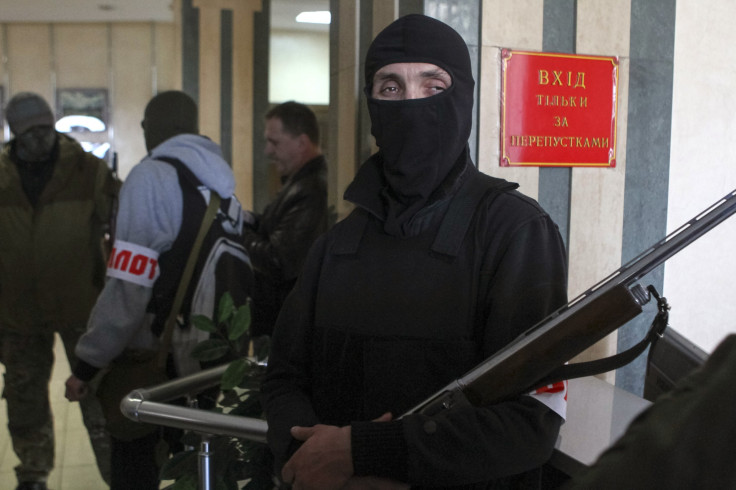Eastern Ukraine Rebels, Arms In Hand, Say They Will Resist To The End

SLOVIANSK, Ukraine -- Some 2,000 miles to the west in Geneva, the diplomats had decided that the conflict here was supposed to end. The pro-Russian separatists who had captured government buildings here and across eastern Ukraine would have to give them up and go back to whatever they had been doing before.
But the directive from Switzerland fell on deaf ears in eastern Ukraine. "We will not disband until the Kiev Junta dissolves itself first," a militia member in Slovyansk said, echoing the statements made by other militiamen encountered in eastern Ukraine. He was employing the pejorative term, junta, that pro-Russian Ukrainians use to refer to the interim Ukrainian government that took over after President Victor Yanukovich fled the country in February.
Ukraine, Russia, the U.S. and the EU reached an initial deal on Thursday calling for rebels to surrender the buildings they have occupied and lay down their weapons. But pro-Russian separatists showed no signs of yielding.
Adding to the confusion and the uncertainty about what comes next, the separatists said they were not taking orders from Moscow, and rejected the notion that Russia represented them in the talks that produced the international agreement.
Denis Pushilin, an official with the self-styled People's Republic of Donetsk, said the government led by interim Ukrainian President Oleksander Turchynov must resign before separatists make any move. Pushilin also said that plans for a referendum to decide on the status of the Donetsk district still stand and that Russia did not represent them at the negotiations in Geneva.
A statement by Ekaterina Gubareva, foreign minister of People’s Republic of Donetsk -- a self-proclaimed state that no government recognizes -- reflected the same sentiment. According to the statement, read aloud by a spokesperson outside the occupied building of the regional council in Donetsk, Gubareva said, “Our warnings about the legal and political meaninglessness of an ‘all-Ukrainian’ dialogue without the participation of the legal representatives of Eastern Ukraine and the People’s Republic of Donetsk, unfortunately, are fully justified.” The crowd cheered the announcement that the separatists would stay the course.
It is not clear how the Ukrainian government will react in the face of what amounts to an armed rebellion. Repression could provoke more separatist fervor elsewhere in the Donbass, the coal-rich, industrial heartland in eastern Ukraine that constitutes the backbone of the country’s economy. Russian speakers who tend to resent the Kiev government’s ties to the European Union are the majority in the region.
At a Ukrainian military base in Mariupol, an army spokesman said personnel expect a new attempt by separatists to storm the base. A previous attack on Wednesday was repelled by police, leaving three dead and 13 injured, in the deadliest incident since pro-Russian separatist protests broke out in the country's east.
"We will use our weapons if we are attacked,” said Sgt. Bogdan Stedenk.
Still, a soldier at the base who requested anonymity said troops didn't have clear instructions on how to respond in case of a second attack. He said he witnessed the first one, in which what he described as hundreds of people massed outside the gate, trying to break in. "Police at first tried to dispel them by shooting in the air, but then some in the crowd were armed with Makarov guns [semi-automatic pistols] and opened fire." That was when the police responded, he said.
"The people attacking us weren't only Russian speakers," the soldier, a Russian-speaking Ukrainian himself, said. "I heard a lot of Ukrainian speakers among the crowd."
Alexander Tarasov, 59, a spokesman for the People's Militia of the Donbass that is occupying the regional administrative building in Mariupol, said his men were not planning any attack. “Sunday is Easter. We are Orthodox Christians and are not going to fight with our brothers then,” he said.
It is not clear, however, who the rebels respond to. Their answers about leadership are vague, and each group appears to have a different leader. At a rebel checkpoint in Sloviansk, less than a two-hour drive from Donetsk, a masked spokesman armed with an AK-47 assault rifle and a Makarov said their leader was one Vyacheslav Ponomarev, and that they were members of the People’s Self-Defense Militia.
People in the crowd occupying the regional council building in Mariupol said they were members of the People’s Militia of the Donbass, whose members are also present in the occupied Donetsk building. Not everyone in Donetsk, however, appears to respond to them. Alexander Maltsev, press secretary for the self-proclaimed People's Republic, said he was accountable to the “Republic’s authorities and no one else.”
Separatists in Mariupol and Donetsk said they were unarmed, but elsewhere, heavy weaponry was on open display.
"We don't have any weapon in this building," the People's Militia of the Donbass Tarasov said as he manned the barricades surrounding the government building, under a collection of flags including the Russian flag, the flag of the PRD -- basically a Russian flag with the top white stripe replaced with a black one -- as well as a number of Soviet-era flags with the hammer and sickle.
In Donetsk, Maltsev showed his hands and piles of stones behind the barricades when asked about weapons. “These are our weapons, and with those, arm in arm, we are going to stay here,” he said.
In Sloviansk, a city that feels as if it is in a time warp, like a reenactment of the Soviet era -- with Lenin portraits and people filing in and out rusting factories belching out black smoke -- a militia member balked for a minute when asked about Russia agreeing in Geneva to their disbandment. “We are not separatists ... We love Ukraine, we want a federation within the country,” he said. Then he paused, and as he was holding on to his Kalashnikov, said, “We are fighting for peace.”
© Copyright IBTimes 2024. All rights reserved.





















